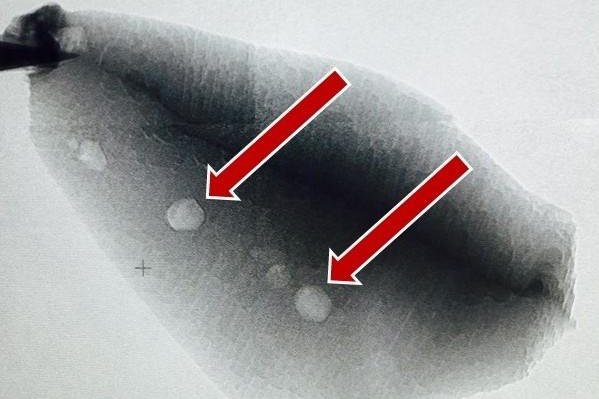Pieces of carbon found in a 4.1-billion-year-old zircon crystal suggest life on Earth may have begun earlier than previously thought. Photo by UCLA/Stanford
LOS ANGELES, Oct. 20 (UPI) -- Because zircon crystals are nearly indestructible, they operate as mini time capsules for geoscientists -- their trappings offer an unblemished record of the past.
Recently, researchers at UCLA and Stanford analyzed 10,000 of the oldest zircon crystals ever discovered, sourced from ancient magma deposits in Western Australia. Inside a single 4.1-billion-year-old zircon fleck, scientists found pure carbon in the form of graphite.
The carbon's composition resembles modern organic carbon, leading researchers to believe it was created by a photosynthetic creature. If so, that would mean life began on early Earth 4.1 billion years ago, 300 million years earlier than scientists previously thought.
Researchers acknowledged several nonbiological processes that might explain the carbon's presence, but believe organic photosynthesis is the most plausible scenario.
The new findings are in line with recent research suggesting early Earth was perhaps more hospitible than scientists once thought. Researchers now know liquid water was present on Earth, and now it appears simple organisms may have been quick to populate the newly born planet.
Researchers detailed their latest discovery in a paper published Monday in the journal PNAS.
"Twenty years ago, this would have been heretical; finding evidence of life 3.8 billion years ago was shocking," study co-author Mark Harrison, a professor of geochemistry at UCLA, said in a press release. "Life on Earth may have started almost instantaneously. With the right ingredients, life seems to form very quickly."
Harrison and his colleagues say their findings show the so-called Hades eon wasn't all that inhospitable, and suggests basic life forms may be more common on Earth-like exoplanets.
"The early Earth certainly wasn't a hellish, dry, boiling planet; we see absolutely no evidence for that," Harrison said. "The planet was probably much more like it is today than previously thought."
Researchers hope to find more zircons with carbon in them, to prove their latest findings aren't a fluke. But other scientists say the only way to say for sure whether biological processes produced the carbon, is to find older carbon-flecked rocks on Mars.
"If we can find evidence for the existence of life on Mars at that time, then it will be easier to argue the case that it was also present on Earth," Alexander Nemchin, a geochemist at Australia's Curtin University, who wasn't involved in the most recent study, told Science.















